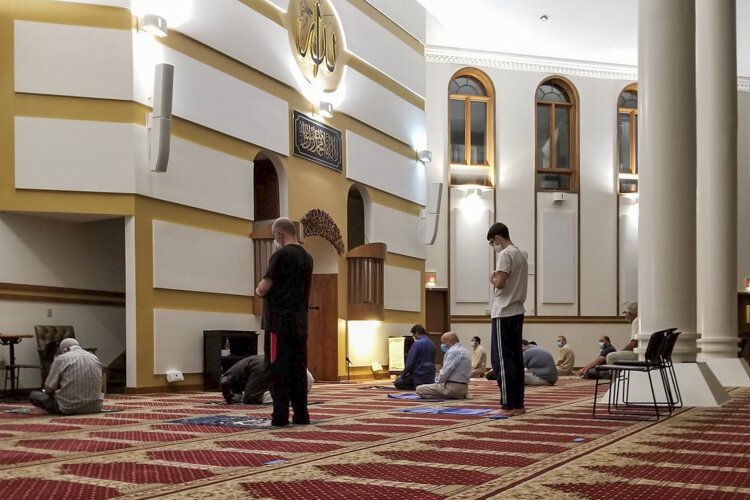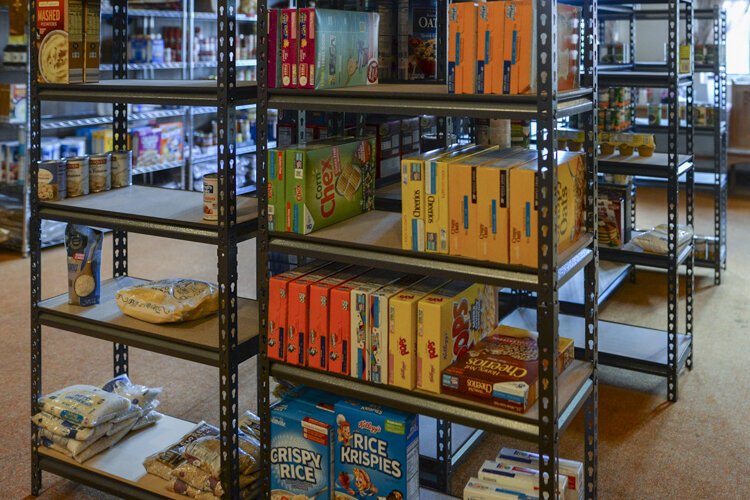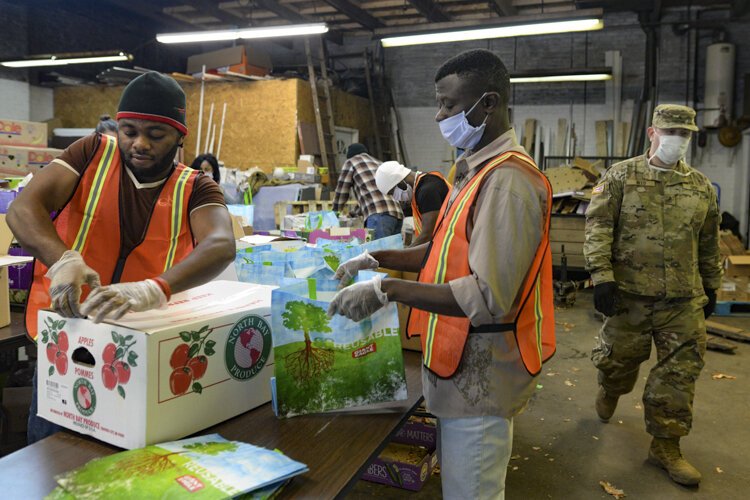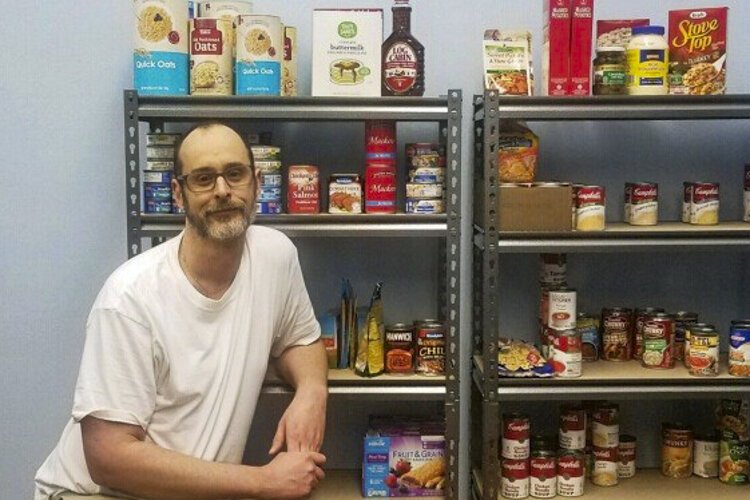Leap of faith: How COVID-19 has changed the way we worship
The chapel in West Park United Church of Christ (UCC) was once a place for quiet reflection, prayer, and congregational worship.
Now, the pulpit has been pushed aside to make way for a shelf of cereal boxes, while a carved depiction of Jesus is half-hidden behind canned goods and paper products.
The chapel has been repurposed to provide space for West Park UCC’s food pantry, which provides non-perishable items to approximately 117 food insecure families each month.
“When the pandemic first began, the pantry was just one closet,” says Jason Thompson, the church’s pastor. “Now, it fills the whole room.”
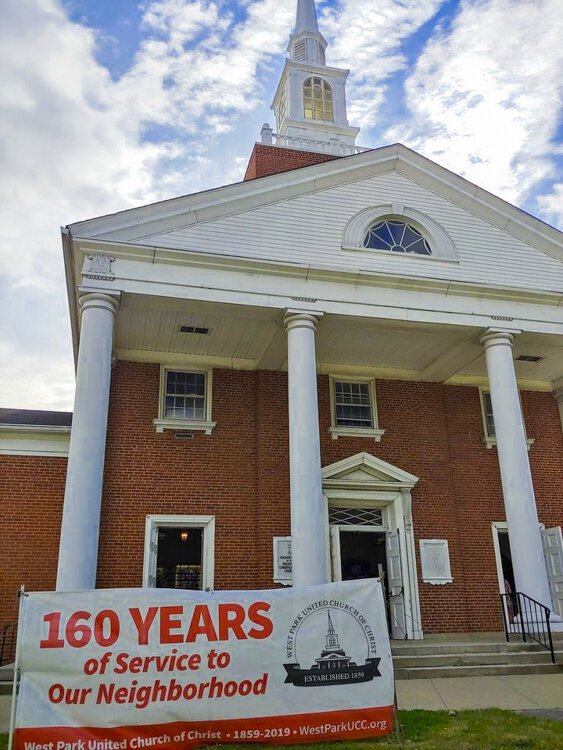 The chapel in West Park United Church of Christ has been repurposed to provide space for West Park UCC’s food pantry, which provides non-perishable items to approximately 117 food insecure families each month.The food pantry isn’t the only program at UCC that has expanded amidst the pandemic.
The chapel in West Park United Church of Christ has been repurposed to provide space for West Park UCC’s food pantry, which provides non-perishable items to approximately 117 food insecure families each month.The food pantry isn’t the only program at UCC that has expanded amidst the pandemic.
The church, which moved all its services online in March, also created a call circle to touch base with every member of the congregation each week, as well as a food delivery program for individuals in Ward 17 who had been sheltering in place. The program was funded by donations at a $25,000 grant from the Cleveland Foundation.
“In February, our food program provided food to 18 families, says Thompson. “In April, we served 480 people. A program that would have normally taken us six weeks to create was built in nine days.”
The food program draws volunteers not only from the church, but from the community as well.
“Of our volunteer drivers, very few are members of the church,” says Thompson. “We’ve had people who have just heard about us in the community, reached out, and said ‘I like what you’re doing. I want to be a part of that.’”
The 185-member church is among the many religious institutions that have had to re-imagine its religious traditions in the face of the pandemic, including moving services online.
A July Pew Research Center study found that among Midwesterners who regularly attend religious services, 75% had participated in online services only.
But for many religious groups, communal worship is just one component of their missions. Thompson stresses that service to the community—through community meals, food distributions, and clothing handouts—are a crucial part of his church’s identity. This component was challenged when people could no longer gather in person.
Yet West Park UCC and others religious institutions in Cleveland have found ways to continue—and often expand—their service programs in the face of the pandemic.
Online Worship and In-person support
Like UCC, The Islamic Center Cleveland (ICC) in Parma began offering streaming messages from the mosque’s leader, Imam Hamzah Maqbul, in lieu of in-person prayers in March.
The ICC, which serves as both a cultural center and worship space for Cleveland Muslims, also combined virtual worship with in-person gatherings for major holidays.
For the annual Eid al-Adha celebration, which occurred on July 31, the mosque held a drive-through service.
“Usually, we have two services with about 5,000 people total,” says Ameena Abdelfattah, a member of the ICC’s Women Committee and Outreach Committee. “Eid is a time to pray together, visit family members, and exchange gifts.”
 The Islamic Center Cleveland began offering streaming services in lieu of in-person prayers in MarchThis year, the celebration was conducted outside, with community members driving into the parking lot, praying next to their cars, then listening to the Imam’s message through the radio.
The Islamic Center Cleveland began offering streaming services in lieu of in-person prayers in MarchThis year, the celebration was conducted outside, with community members driving into the parking lot, praying next to their cars, then listening to the Imam’s message through the radio.
At the same time, the ICC has expanded its pre-existing social services. Before the pandemic, the mosque partnered with the Greater Cleveland Food Bank to provide fresh fruits and vegetables to 300 to 500 each month.
Once the pandemic hit, the ICC moved to a drive-through model, grew to serve an average of 860 individuals per month.
Abdelfattah says there were many people who were coming to the food bank for the first time in their lives.
“We see people who have a lot of shame about coming to the food bank,” she says. “We make sure that everyone is treated with the same dignity.”
The ICC has also continued cooking monthly lunches for the local homeless shelter and running free health clinics on Saturdays. Additionally, members provide cash assistance to single mothers who have encountered economic hardship.
Abdelfattah says that the food distributions, as well as the other outreach programs, are rooted in the Islamic ethic of providing charity, or “Sadaqah.”
“I believe that if I have a neighbor who has nothing to eat, it is my neighbor’s right over me to ask me to help them,” says Ameena. “It is a sin to not take care of one another.”
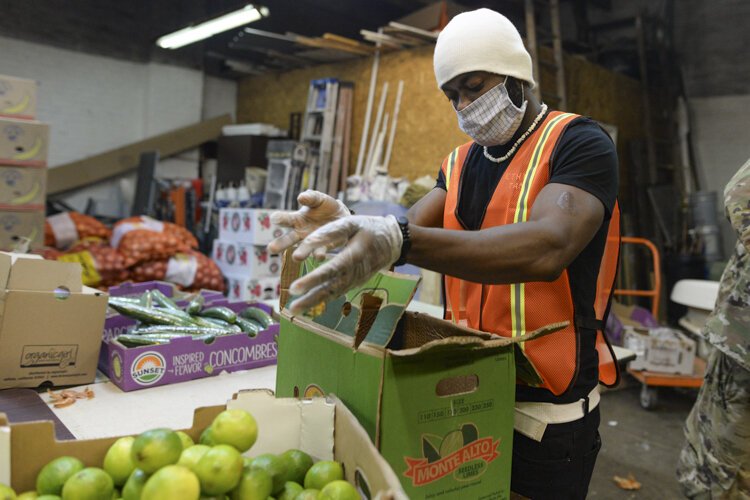 St. Luke’s Episcopal Church’s weekly meal has provided an important opportunity to connect with congregation members and the surrounding neighborhood.Equity in Worship
St. Luke’s Episcopal Church’s weekly meal has provided an important opportunity to connect with congregation members and the surrounding neighborhood.Equity in Worship
For other urban churches, however, the challenge has been to not only continue social services, but to provide equity in worship.
“We’ve offered Zoom worship services, because the congregation still wants to interact with one another to worship together,” says Chris Decatur, Deacon-in-Charge at St. Luke’s Episcopal Church in the Detroit Shoreway neighborhood. “But not everyone in our community has access to technology. If you don’t have a smart phone, then you can’t participate in worship.”
Decatur says they are looking for ways to host socially distanced services in the church parking lots and gym later this month.
For Decatur, the church’s weekly meal has provided an important opportunity to connect with congregation members and the surrounding neighborhood. The meal—once a time when community members could sit down and spend time together—has been replaced by a to-go dinners.
Decatur uses the time beforehand to talk with neighbors on the sidewalk while they wait for their meals. He says a new community has developed on the curbside.
“I just try and be there for people—whether it’s a woman who is crying because she’s just lost her job, a parent whose worried about how their kid is going to get educated, or an individual who’s just exhausted with being a minority in an America and witnessing police violence.”
The church has also worked with Detroit Shoreway officials to provide information on voter registration at each meal, encouraging people across party lines to sign up to vote.
Decatur’s curbside clergy support has been supplemented by other outreach efforts, such as “My Brother’s Cloaks,” which sets up outdoor racks of free clothing, socks, and underwear for attendees at the Wednesday meal.
St. Luke’s also runs a twice monthly drive-through food bank, which has doubled from 100 clients per month to 200 clients per month since the pandemic started.
Re-opening Challenges
Members and leaders of West Park UCC, St. Luke’s, and ICC all say they expect their social services to continue, and even expand, as they plan to re-open in-person services. But all of them also plan to continue offering online programming.
“The pandemic has actually moved us forward 10 years in our use of digital technology,” says Thompson. “We now have people streaming our services from all over the country, and even one person internationally.”
Thompson says he believes the congregation will continue to remain engaged in social services even as the pandemic become less severe and in-person services resume. Church officials have pegged their re-opening to the Ohio Public Health Advisory System and will only re-open once Cuyahoga County reaches Yellow status.
Church officials have also instituted public health measures for the service—no singing, congregants mandated mask wearing, and six feet of distance between each person.
Thompson admits that the coronavirus restrictions do pose theological challenges, however.
“We believe that everyone is welcome. We will not turn anyone away. So, what will we do if 51 people show up to service, but we only have space for 50 people with social distancing?”
Thompson says he will offer as many services as necessary to accommodate everyone.
For Decatur, the forced shift to online services has provided an opportunity to not only experiment with new modes of worship, but to re-envision what church means to the neighborhood.
“For so long, the headlines around church attendance in the United States have been ‘the numbers in the pews are dwindling,’’ he says. “Well now, there is literally no one in the pews. I think it’s time we stop measuring our success as a church by how many people are sitting inside. We should measure our success as a church by the degree to which we are willing to step out on the curb and serve our neighbors.”
This is the first of a three-part series on how COVID-19 will affect the way Cleveland worships, the city’s travel and tourism market, and working remotely and the commercial office space market. It is made possible with funding from Google's Journalism Emergency Relief Fund.

